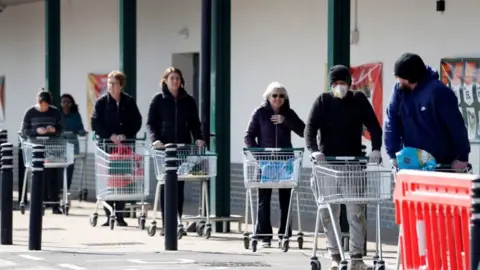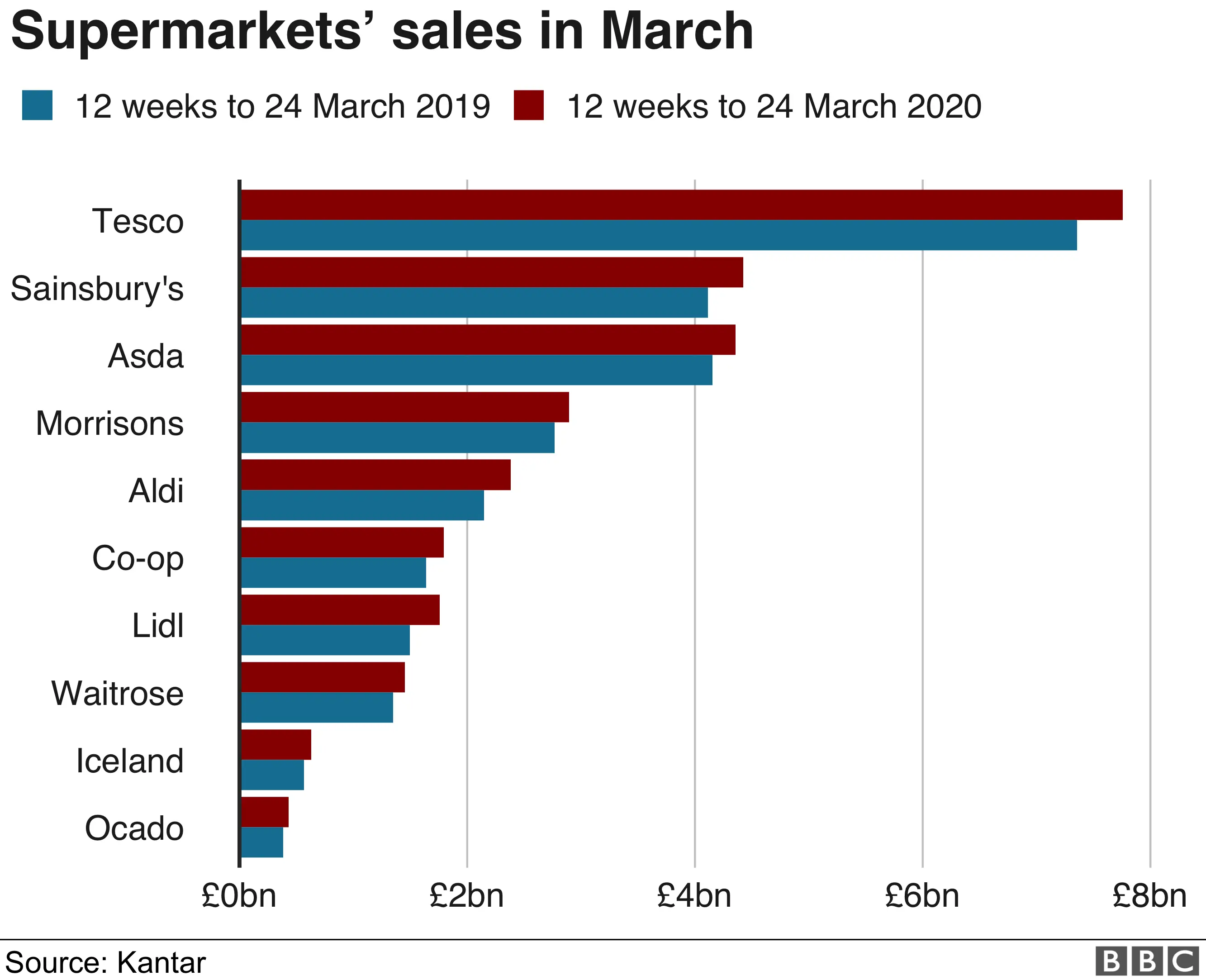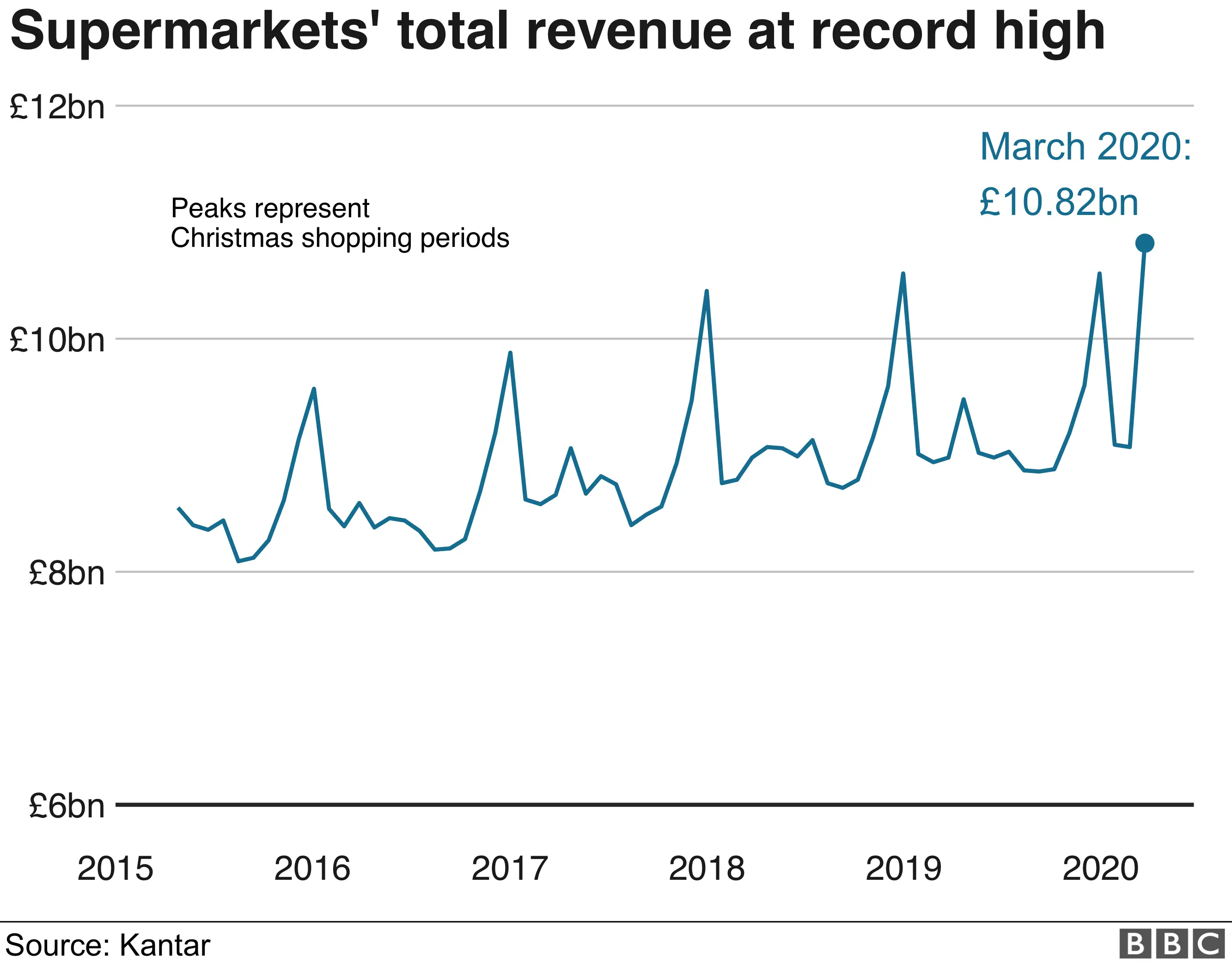Coronavirus: Aldi, Morrisons, Waitrose and Asda lift some restrictions
 Getty Images
Getty ImagesAldi, Morrisons, Waitrose and Asda are easing restrictions on some of their products which were imposed in the wake of stockpiling earlier this month.
All the major supermarkets restricted customers to buying fixed numbers of individual items to keep shelves full.
Aldi is now scrapping limits completely on all but a few items, while Morrisons, Waitrose and Asda have also removed some limits and changed others.
Meanwhile, grocery sales in the UK were at record levels in March.
Aldi customers will be able to buy as many as they want of most items in its stores.
However, they will only be allowed to purchase four of some - including hand wash and soap, toilet roll, certain canned goods and alcohol - and two of antibacterial hand gel, UHT milk and baby formula.
Morrisons is upping the limits on some items from three to four per customer and removing some altogether to make it easier for people to donate to food banks.
The supermarket will create local drop-off points for customers to donate products to others and will distribute £10m of food to food banks itself.
Waitrose is removing its cap on all fresh food, so meat, fish, poultry and other fresh goods can now be purchased freely along with fruit and vegetables.
Alcohol and Easter confectionery are also not subject to limits, although restrictions do remain on certain items.
Asda is removing limits on fruit and vegetables and chilled products.
Tesco, Sainsbury's and Co-op are not changing their policies on restrictions at the moment.

Meanwhile, figures from consumer analysts Kantar showed huge increases in shopping in the UK this month.
The busiest spell was from 16-19 March, when 88% of households visited a food store, adding up to 42 million extra trips across four days.
In the last four weeks, year-on-year supermarket sales grew by 20.6%.
Kantar's Fraser McKevitt said £10.8bn sales in the past four weeks were "even higher than levels seen at Christmas".
The figures have mainly risen because of people making extra shopping trips, rather than spending more on each visit.
The average household spent an extra £62.92 during the past four weeks, equivalent to adding five days' worth of groceries.
London had the biggest increase, with grocery spending up by 26% during the month.

- EASY STEPS: What can I do?
- CONTAINMENT: What it means to self-isolate
- UK LATEST: What's the UK's plan and what could happen next?
- MAPS AND CHARTS: Visual guide to the outbreak
- VIDEO: The 20-second hand wash

Mr McKevitt added: "It's inevitable that shoppers will add extra items to their baskets when faced with restrictions on their movement.
"With restaurants and cafes now closed, none of us can eat meals on the go any longer and an extra 503 million meals, mainly lunches and snacks, will be prepared and eaten at home every week for the foreseeable future."
Online grocery spending was 13% higher than in the same period last year.
The average online basket cost £81.88, which was £6 more than in March 2019, while 14.6% of households received an online delivery - up from 13.8% at the same time last year.
Sales of alcohol rose by 22% - an extra £199m.
There was also a rise in spending for families with children over the age of 16, which is likely to be down to the youngsters returning early from college or university. Those families spent £508 on average on groceries in March, £88.13 more than they did in the same month last year.

Supermarket spending data from analysts Nielsen showed that in the week ending 21 March, many shoppers had filled their cupboards and instead were deciding to stock up the freezer.
Its figures showed that sales of frozen food that week rose by 84% compared with the same period last year.
Nielsen's Mike Watkins said there had been a "seismic shift in overall shopping patterns".
He added: "Unlike stores, there is a finite capacity for online grocery shopping, due to warehouse capacity and available delivery slots, and this will have limited the growth of online sales."
Online deliveries have been a sticking point for many people, who have found themselves unable to book slots and follow Prime Minister Boris Johnson's request to use online deliveries and stay at home.
Tesco, which last week limited online orders to 80 items only, has now expanded its home delivery and click and collect services to about 780,000 slots this week - up from 660,000 two weeks ago. It has plans to add another 100,000 slots in the coming weeks.
It has also recruited more than 7,500 staff and added more than 200 new vans to its fleet.
Asda is also recruiting more delivery drivers, while Sainsbury's has introduced priority slots for elderly and vulnerable customers and is contacting eligible customers on its database.
Morrisons is creating 3,500 new jobs to help expand its online delivery service, while Waitrose says it will set aside at least a quarter of its delivery slots to elderly or vulnerable people and is working to identify eligible customers.
